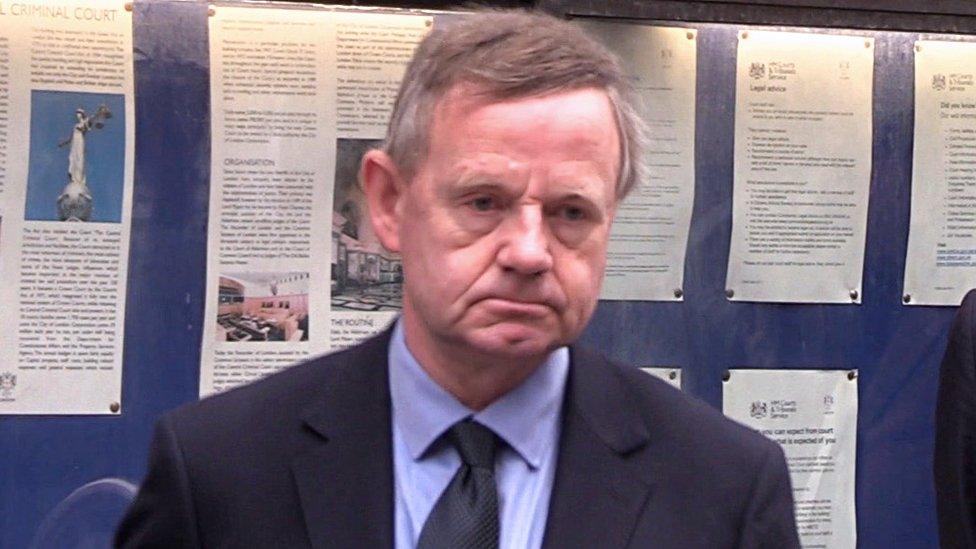Andy Hill: Who is the Shoreham Airshow disaster pilot?
- Published
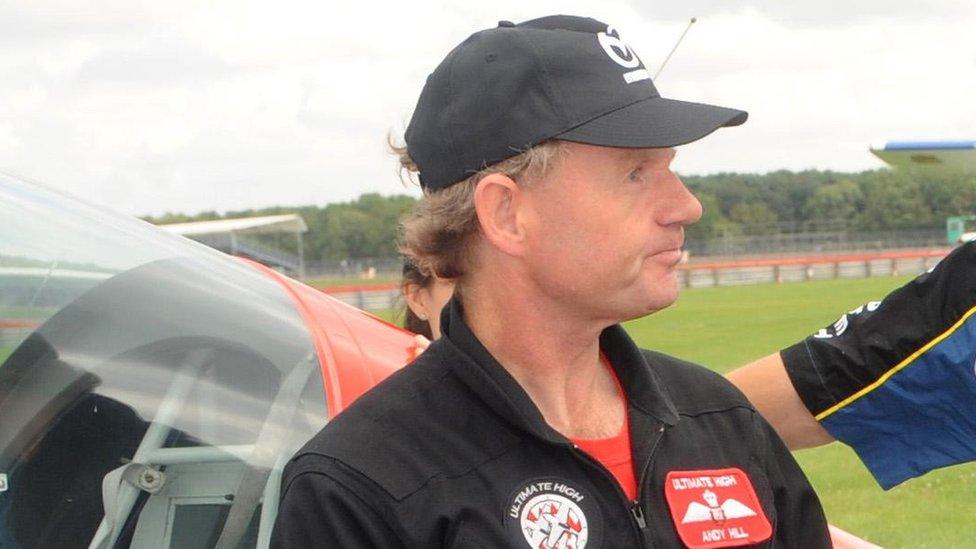
Andy Hill was known as "The Prof" by colleagues at BA and the RAF
Andrew Hill has been cleared of 11 counts of manslaughter after crashing an eight-tonne jet on to a busy road in a failed aerobatic loop. Who is the pilot at the centre of the deadliest air show disaster in Britain in more than 60 years?
Eighteen months before Andy Hill crashed an ex-military jet and killed 11 men outside the Shoreham Airshow, the former RAF and British Airways pilot's aerobatic prowess featured in an episode of ITV drama Midsomer Murders.
His home-built plane simulated an out-of-control dive, in which the pilot narrowly avoided a crowd of spectators after pushing his aircraft to the limit.
An air traffic controller warned the fictional pilot: "You are headed for the crowds."
It would prove to be a tragic foreshadowing.
When the 1950s Hawker Hunter struck queuing traffic on 22 August 2015, it became the deadliest air show accident in Britain since 31 people lost their lives at Farnborough in 1952, external.
For Mr Hill, who miraculously escaped with his life after being thrown from the cockpit, it was a dark chapter in a decades-long love affair with flying.
"He has aviation fuel running through his veins," said Sean Maffett, an air show commentator who regularly worked with Mr Hill.
"He is an extraordinary man, there is no question about it."
Shoreham Airshow pilot simulated mayday flight
Andrew Grenville Hill, who was born in March 1964, was educated at the prestigious Tonbridge School in Kent and began his flying career aged 17 when he took to the skies as part of a Royal Navy scholarship.
A little over three years later, in 1984, he joined the RAF, fresh from the University Air Squadron at Cambridge University, where he had studied computer science at Christ's College.
His record shows him to be among the most skilled of his peers and, in his own words, he was "creamed off the top" to fly a Harrier jump jet - viewed as one of the most difficult planes to master.
"The Harrier Force was the top of the pile - that's where the best guys went," said Bob Marston, a former Harrier flying instructor and RAF pilot of more than 40 years, and the author of Harrier Boys.
"They have to have the best physical co-ordination to master the aeroplane and they need workload capacity to be able to multitask."
Stationed in West Germany in the final throes of the Cold War, his days would likely have been taken up flying training drills from camouflaged launch sites, preparing to strike "Soviet tanks coming en masse over the border from East Germany", Mr Marston said.
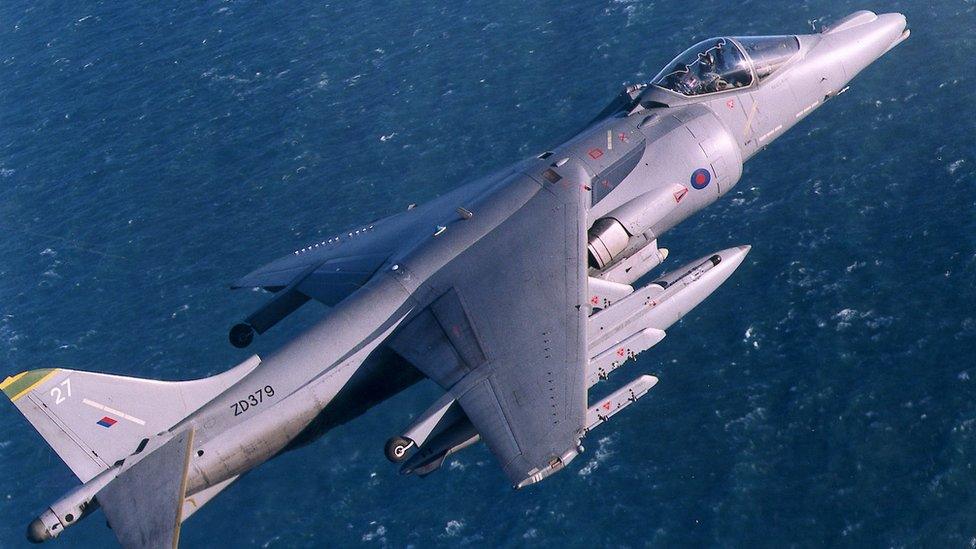
Mr Hill flew the Harrier jet during his time in the RAF
Mr Hill later flew preventative sorties out of Incirlik, Turkey, as part of the northern Iraq no-fly zone intended to protect Iraqi Kurds from Saddam Hussein's forces after the First Gulf War.
Within three years of joining the RAF, he had qualified to instruct new pilots in the use of the Jet Provost and went on to teach basic flying skills to new recruits at RAF Linton-on-Ouse, North Yorkshire.
However, he did not only excel in the air. Combining his twin passions of computing and aviation, Mr Hill developed a digital version of the Harrier's operating manual that was cleared for use by the MoD.
"That was an exceptional piece of work," said Maj George Bacon, who flew for both the RAF and the Army Air Corps in a career spanning more than four decades.
Shoreham Airshow pilot acquitted over deaths
'As soon as I wake up every day I miss him'
Shoreham pilot in TV mayday flight
Mr Hill was an "outstandingly talented pilot and he is of course a very intelligent man as well," he said.
"It probably makes him a little more introvert than the average... probably verging on the nerdy."
This sideline in computer programming was presumably the source of his nickname, "The Prof", that had its origins in the RAF but would follow him into his commercial career with British Airways, which he joined in 1996, after a year with Virgin.
He was promoted to captain six years later, flying passenger jets on both short and long-haul flights around the world.
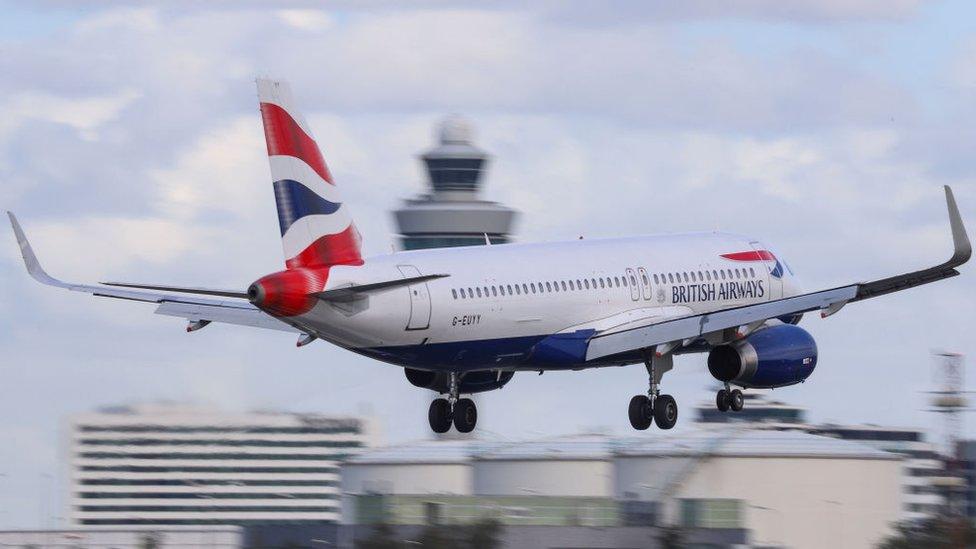
Mr Hill captained an Airbus jetliner for British Airways
For Mr Hill, aviation was more than a day job. In 2003, he began once again to pilot the Jet Provost, flying a former military model from an airfield in North Weald, Essex, and soon began instructing civilian pilots.
In late 2005, together with his wife Ellen, a fellow BA pilot, he embarked on a self-build project, assembling a single-engine plane in the double garage of their home.
The couple documented their progress on a now-deleted website, uploading stage-by-stage photos as they assembled the parts of the Van's RV8, which were shipped from the manufacturer in Oregon.
Having completed the plane, which bore the registration tag "G-Hilz" on its wing, in October 2007, Mr Hill regularly flew from his Hertfordshire farmhouse, using it to commute to North Weald Airfield.
BBC News has learned that he took off and landed on a 500-metre grass field next to his home near Sandon.
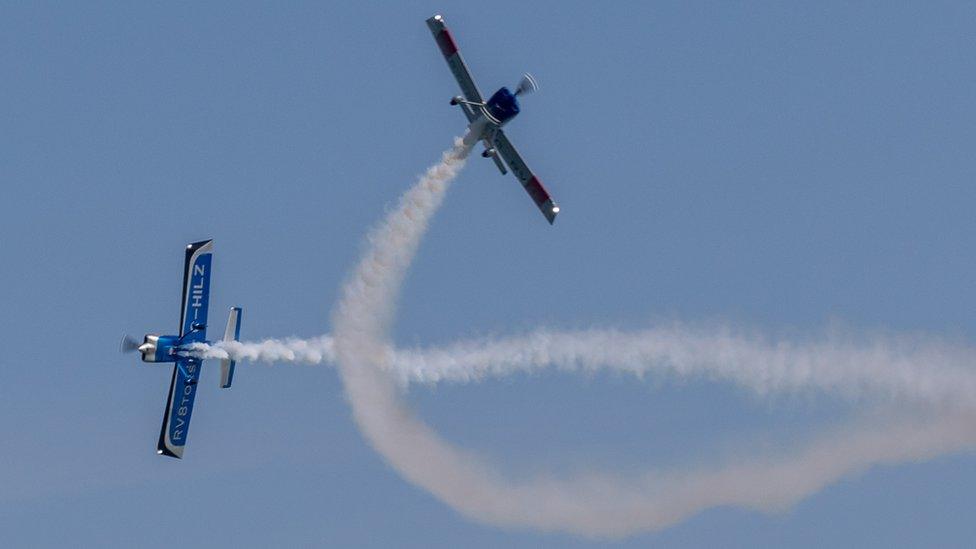
The RV8Tors garnered fans with their close-quarters aerobatic displays
In 2008, he obtained permission from the Civil Aviation Authority to perform aerobatic displays in the home-built plane.
With experienced display pilot Alister Kay, he launched a two-man formation flying team, known as the RV8Tors, a punning portmanteau of "RV8" and "aviators".
The pair flew their matching planes at air shows and weddings, describing their "daredevil" performances as "thrilling and unforgettable". By 2012, they were estimated to have flown in front of nearly three million people.
The duo's fast-paced formations picked up a devout following on the air show circuit and they became known for their signature finale, a smoke-trail heart.
Air show regulars were among the more than 1,900 people to join a Facebook group, entitled Support for Andy Hill, in the days after the crash.
Alongside supportive messages, which continued throughout the trial, members of the group sent cards to the Hills' home address and even posed beside a Hawker Hunter holding a banner that read "Get well soon, Andy Hill" three months after the crash.
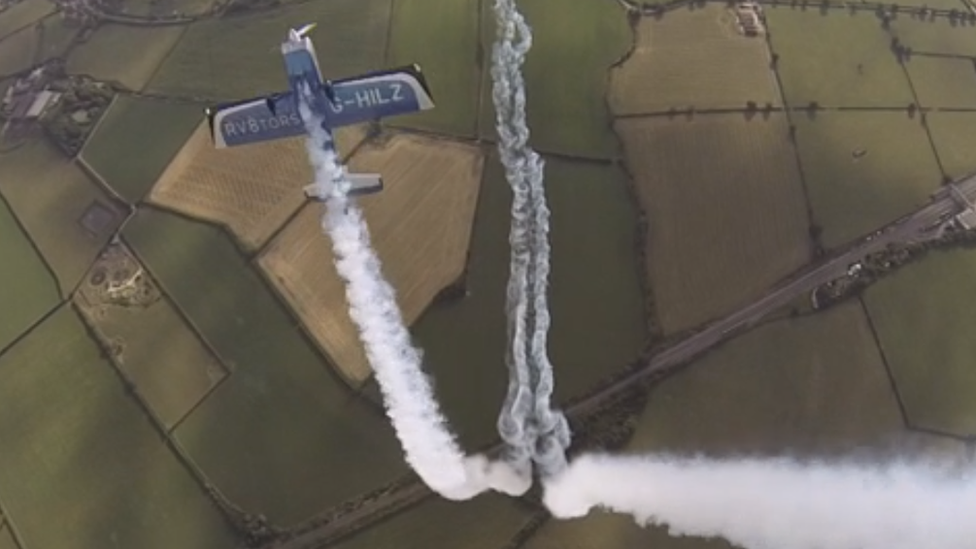
Andy Hill's self-built plane simulated an out-of-control flight on ITV's Midsomer Murders
Mr Hill had begun to fly the Hawker Hunter with a display group called Team Viper in 2011.
The outfit was led by Dan Arlett, who was described at Mr Hill's trial as one of the RAF's most experienced fighter pilots who now helps prepare the next generation of frontline airman by posing as hostile aircraft in simulated dogfights.
Giving evidence during the trial, Mr Arlett, an RAF squadron leader, said Mr Hill was "probably the most diligent of all the team".
He told the jury that air show pilots flew well-drilled displays, within the confines of their abilities.
"You are not showcasing yourself," he said. "You are showcasing the aircraft."
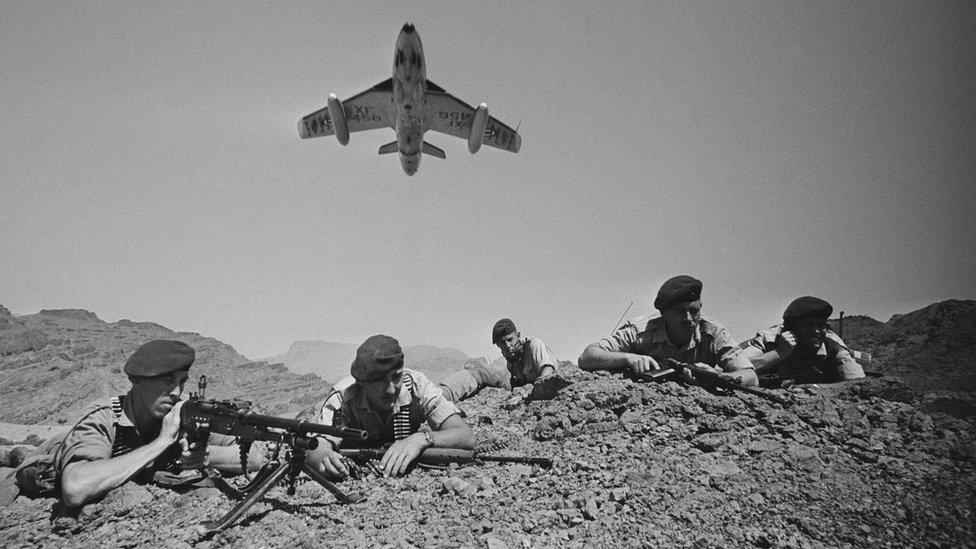
The Hawker Hunter, seen here during the Aden Emergency in 1967, flew in conflicts throughout the second half of the 1900s
So, why does a commercial airline pilot, who has unlimited access to a plane that can take off and land on a personal airstrip, spend his weekends flying public displays?
"Going to air shows is quite a lot of hassle," said Mr Maffet, who is known as the official commentator of the Vulcan bomber.
"It's hard work and there is no money in it. I think the fascination with flying is such that people do get the bug.
"They can do this extraordinary stuff that most of us mere mortals can't begin to understand. I think that's what it is that drives them on."
The two weeks before the crash demonstrate Hill's dedication, performing eight displays at five different air shows. In the 90 days before, he flew in 33 displays and practice displays.
While he was renowned among air show fans for his dazzling aerobatics, he was known for more mundane reasons to his BA colleagues, who preserved his military nickname, The Prof.
Showing technical savvy first displayed when he digitised the Harrier's manual, Mr Hill designed a software package that allowed BA pilots to automatically book their desired shifts. Known as EasyBid, it was used by more than 1,900 pilots at its peak.
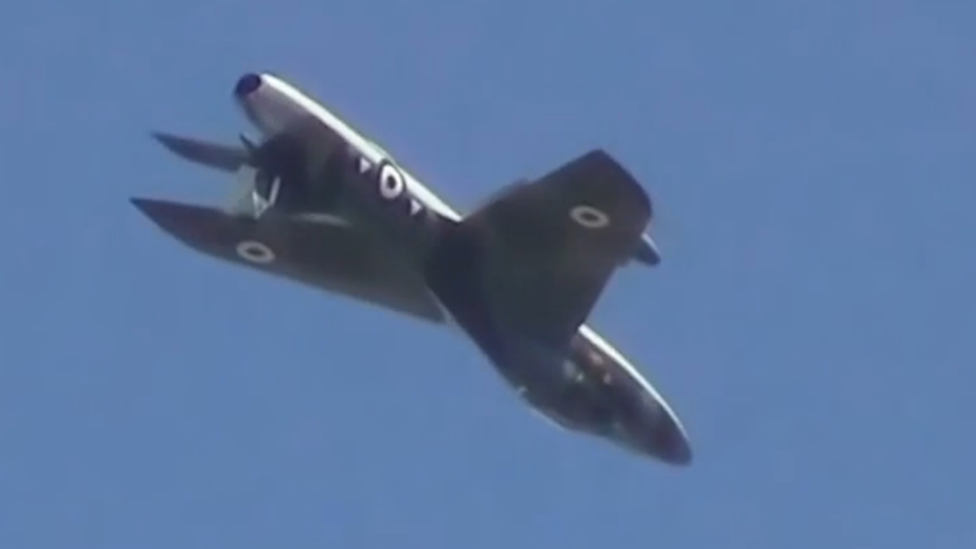
Mr Hill first displayed a Hawker Hunter with Team Viper
Catherine Burton, the most experienced female BA captain at the time of her retirement in 2017, said that, as a result of the software, he was more widely known than a typical pilot.
"At one point, I'd guess at least 75% of our pilots were his customers," she said. "He was well-liked for his excellent customer service in the software line."
But the evidence of the Crown Prosecution Service was at odds with the picture of the conscientious and scholarly pilot.
During the trial, prosecutors pointed to previous air shows at which Mr Hill allegedly infringed rules, with one display drawn to a halt over safety fears, external. He was, the court heard, "reckless" and "cavalier".
Mr Hill denied allegations that, during the 2015 Shoreham display, he knowingly committed to the dive and engaged the plane's "flaps" in an attempt to complete a tighter loop, instead of abandoning the manoeuvre when it became clear he was too low.
So, with all his experience and technical knowledge, did Mr Hill believe he could get away with what, to most pilots, would appear impossible?
Mr Bacon doesn't think so. "I wouldn't conclude that," he said. "I've never known him as an arrogant person."
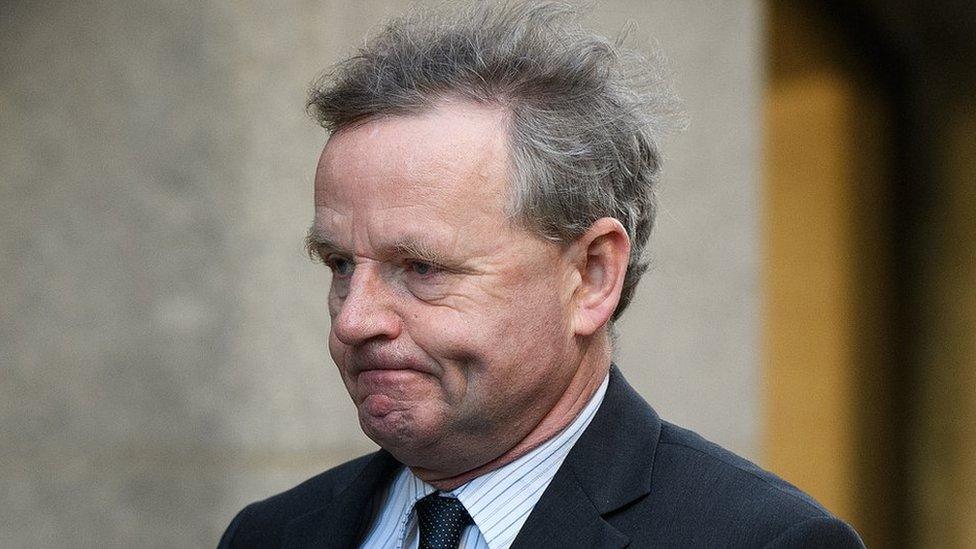
Mr Hill was said to have been living in a "period of purgatory" since waking from a coma in September 2015
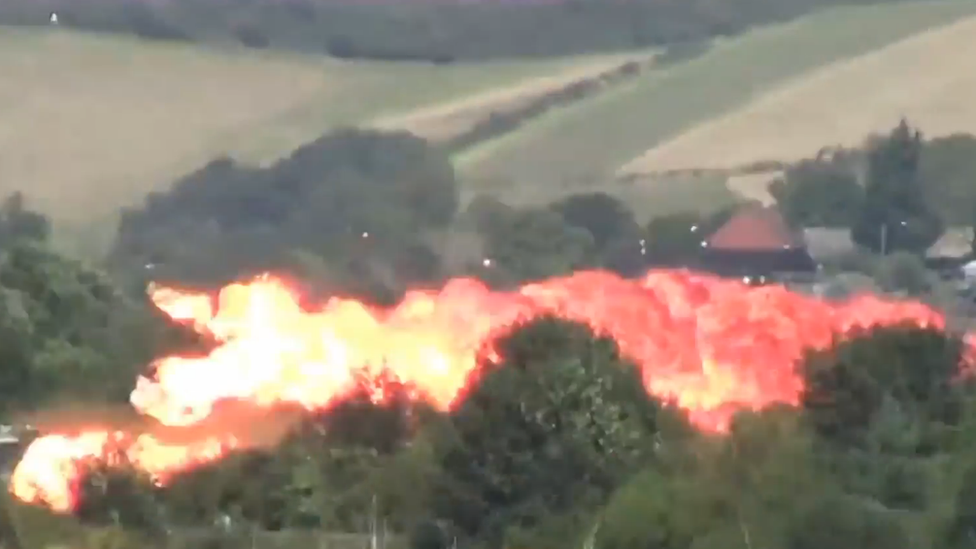
He was thrown from the cockpit of the Hawker Hunter after it crashed
Mr Hill has not spoken publicly about the disaster - save for giving evidence at his own trial - and those closest to him have declined to comment.
Mr Bacon, who has kept in regular touch with Mr Hill since he came out of a coma in September 2015, said he had been living in a "period of purgatory".
"At one stage when I was chatting to him I almost thought this guy was close to having a complete breakdown and may even be close to taking his own life," he said.
"I think he has had to work really hard to give himself enough confidence to even stand on the witness stand."
In the intervening years, his life in the sky has been on hold and neither of his two pilot licences is currently valid.
Now cleared of manslaughter by gross negligence, he is free to walk from court and may soon be back in the cockpit.
"Frankly, I think he will probably have a very quiet life," Mr Bacon said. "He'll carry on flying in his spare time, but I doubt that he will go back to fast jet displays."
- Published8 March 2019
